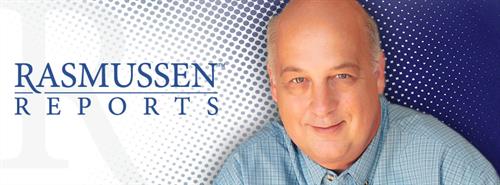
Election 2014: Virginia Senate
Thursday, January 23, 2014
Incumbent Democrat Mark Warner holds a 14-point lead over Republican challenger Ed Gillespie in Rasmussen Reports’ first look at the likely 2014 U.S. Senate race in Virginia.
A new statewide telephone survey of Likely Virginia Voters finds that Warner earns 51% support to Gillespie’s 37%. Two percent (2%) like some other candidate in the race, while nine percent (9%) are undecided. (To see survey question wording, click here.)
Warner, a popular former governor, was first elected to the Senate in 2008 with 65% of the vote. He was expected to have an easy run to reelection until Gillespie, a former George W. Bush administration official and longtime Republican strategist, jumped into the race this month. Republicans will select their Senate nominee in a June 10 primary.
But Gillespie who is already hammering Warner on his support for the new national health care law has his work cut out for him. Sixty-one percent (61%) of Virginia voters have a favorable opinion of Warner, including 36% with a Very Favorable one.
Gillespie, by contrast, is an unknown to 30% of voters in the state. Thirty-seven percent (37%) view him favorably, with only 11% who have a Very Favorable opinion at this point.
Yet even though Barack Obama carried the state in 2008 and 2012, only 41% of Virginia voters have a favorable opinion of Obamacare, while 54% view it unfavorably. This includes 14% with a Very Favorable opinion of the law and three times as many (43%) with a Very Unfavorable one. This is comparable to feelings about the health care law nationally.
Warner has a commanding lead among voters who favor the health care law and has the support of just over half of voters who view it somewhat unfavorably. But Gillespie has a sizable advantage among those who regard the law Very Unfavorably.
The survey of 1,000 Likely Voters in Virginia was conducted on January 20-21, 2014 by Rasmussen Reports. The margin of sampling error is +/- 3 percentage points with a 95% level of confidence. Fieldwork for all Rasmussen Reports surveys is conducted by Pulse Opinion Research, LLC. See methodology.
Thirty-six U.S. Senate seats are at stake this November. Presently, 21 of them are held by Democrats and 15 by Republicans. Democrats currently have a 53-to-45 majority over Republicans in the Senate. In addition, there are two independent senators who caucus with the Democrats. Republicans need a net gain of six seats to take control of the Senate.
Sixty-one percent (61%) of voters in Virginia prefer a smaller government with fewer services and lower taxes over a more active one with more services and higher taxes. Just 28% favor a bigger government instead. This, too, is comparable to voter attitudes nationally.
Voters trust Warner more than Gillespie by a 44% to 32% margin when it comes to government spending and by a similar 44% to 34% margin when it comes to taxes. In the area of social issues, the incumbent has a slightly larger 48% to 30% lead in voter trust. But on every issue, nearly one-in-four voters are undecided.
Gillespie has said he will argue for smaller government during the campaign and portray Warner, who is generally seen as a moderate Democrat, as a champion of big government in large part because of his support of the health care law.
Just 36% of Virginia voters believe the federal government should require every American to buy or obtain health insurance. Fifty-four percent (54%) are opposed to this individual mandate. That’s higher opposition to the mandate than is now found among voters nationwide.
Twenty-one percent (21%) of the state’s voters rate the economy as good or excellent, while 37% consider it poor. But like voters nationally, they give their own finances much higher marks: 41% view their personal finances as good or excellent, and just 15% say they are poor.
Forty-eight percent (48%) now approve of the job President Obama is doing, while 51% disapprove. Comparable to findings nationally, this includes 28% who Strongly Approve and 43% who Strongly Disapprove.
The survey of 1,000 Likely Voters in Virginia was conducted on January 20-21, 2014 by Rasmussen Reports. The margin of sampling error is +/- 3 percentage points with a 95% level of confidence. Fieldwork for all Rasmussen Reports surveys is conducted by Pulse Opinion Research, LLC. See methodology.
